Faculty Duo Publish a Critical Analysis and Research on Cyberbullying
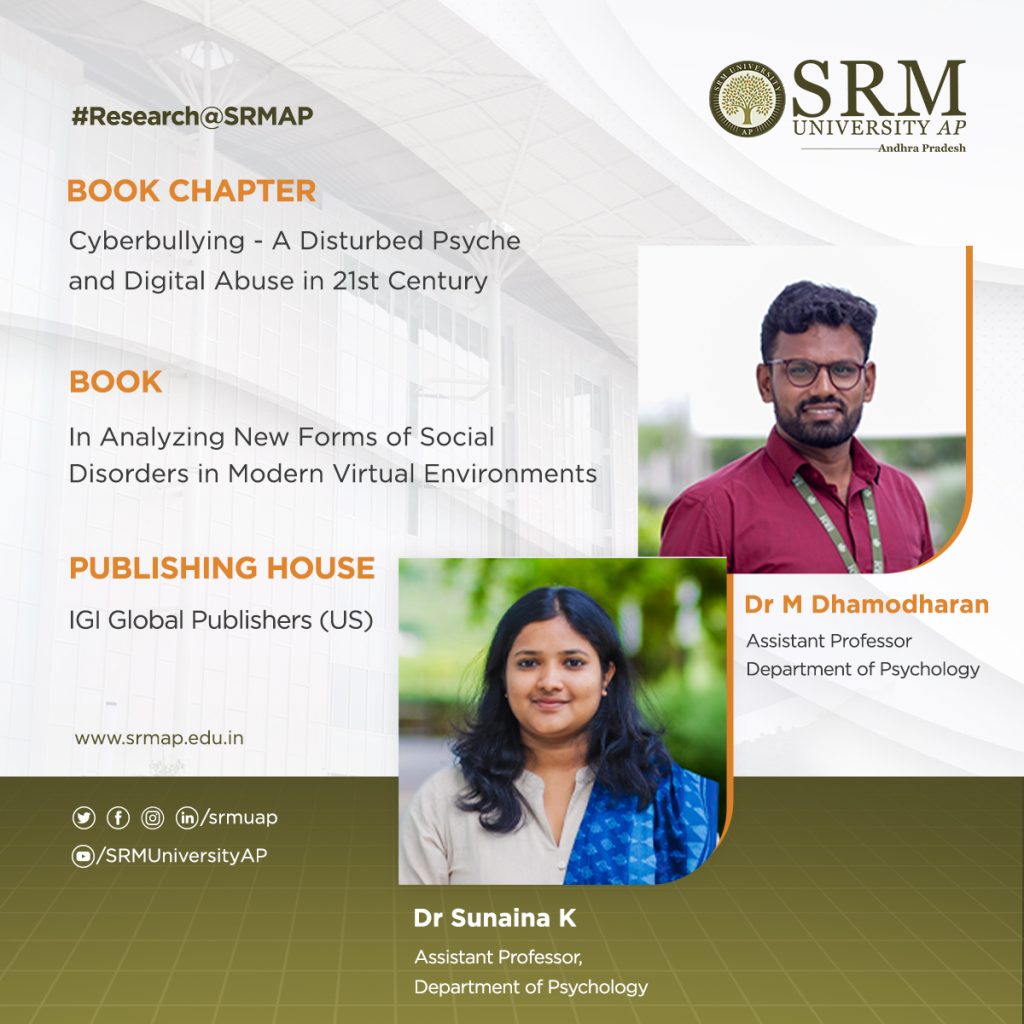
In the digital era, where technology dominates over communication, connection and social relationships, the staggering rise of cyberbullying proves to be detrimental to the social and mental psyche of people. The limited research present regarding the crisis fails to provide sufficient data to critically analyse and initiate policies to combat the same. In this regard, Dr Dhamodharan M and Dr Sunaina K, faculty from the Department of Psychology have conducted insightful research into cyberbullying, the role of technology and the challenges in tackling the act. The faculty duo has published a book chapter titled “Cyberbullying – A Disturbed Psyche and Digital Abuse in 21st Century” in the book In Analyzing New Forms of Social Disorders in Modern Virtual Environments in IGI Global Publishers (US).
Abstract
Cyberbullying is ‘a violent, planned act carried out by a group or specific, using electronic forms of communication, frequently and over time in contradiction of a victim who cannot easily protect him or herself.’ (Smith et al., 2008). According to the UNICEF and Broadband search survey 2023, around 36.5 out of a hundred people feel they were cyberbullied at least once in life, and seventeen percent of people experienced cyberbullying in the last month. 60 out of 100 adolescents experienced cyberbullying. Seventy percent of youths have reported perpetrators. Sixteen percent of women have been stalked at least once in life. 1 in 19 men have been stalked at some point. Fifty percent of LGBTQ people experience cyberbullying. Girls face cyberbullying more than boys. Around 36 percent of girls experience cyberbullying, whereas 24 percent of boys experience cyberbullying. Eighty-three percent of the victims who experienced online bullying also experienced physical bullying. Around 42 percent of the people experience cyberbullying on Instagram, followed by Facebook at 37%, Snapchat at 31%, WhatsApp at 12%, YouTube at 10%, and Twitter at 9%. Cyberbullying refers to using digital technologies such as cyberspace, societal broadcasting platforms, direct messaging, and email to bother, intimidate, or harm others.
This chapter provides an indication of cyberbullying, including its definition, incidence, and impact on individuals and society. Firstly, the chapter reviews the existing research on cyberbullying, exploring its different forms and characteristics and the psychological and social consequences for both victims and perpetrators. Secondly, the role of technology in facilitating and exacerbating cyberbullying is also examined, focusing on the anonymity and distance that online platforms provide. Thirdly, legal and ethical considerations surrounding cyberbullying including the challenges of enforcing laws and policies online are explored. Finally, the chapter highlights the importance of a comprehensive and collaborative approach involving parents, educators, policymakers, and online platforms to address cyberbullying.
Implications
Cyberbullying is a pervasive problem with significant and long-lasting consequences for people, their families, and society. It is essential to address cyberbullying thoroughly and implement effective prevention measures to create a more secure and respectful online environment. Cyberbullying can have detrimental effects on its victims, leading to feelings of helplessness, mental health issues, trouble with schoolwork, and even self-harm or suicide. In addition, cyberbullying affects the social fabric of groups, and trust, and impedes the proper growth of individuals, especially children and adolescents. Cyberbullying has a shocking prevalence worldwide, and it is spreading over to people silently. Traditional bullying differs from cyberbullying; it occurs to the victims in various forms and levels.
- Published in Departmental News, News, Psychology News, Research News
Dr Aswini Presents a Poster on the International Stage
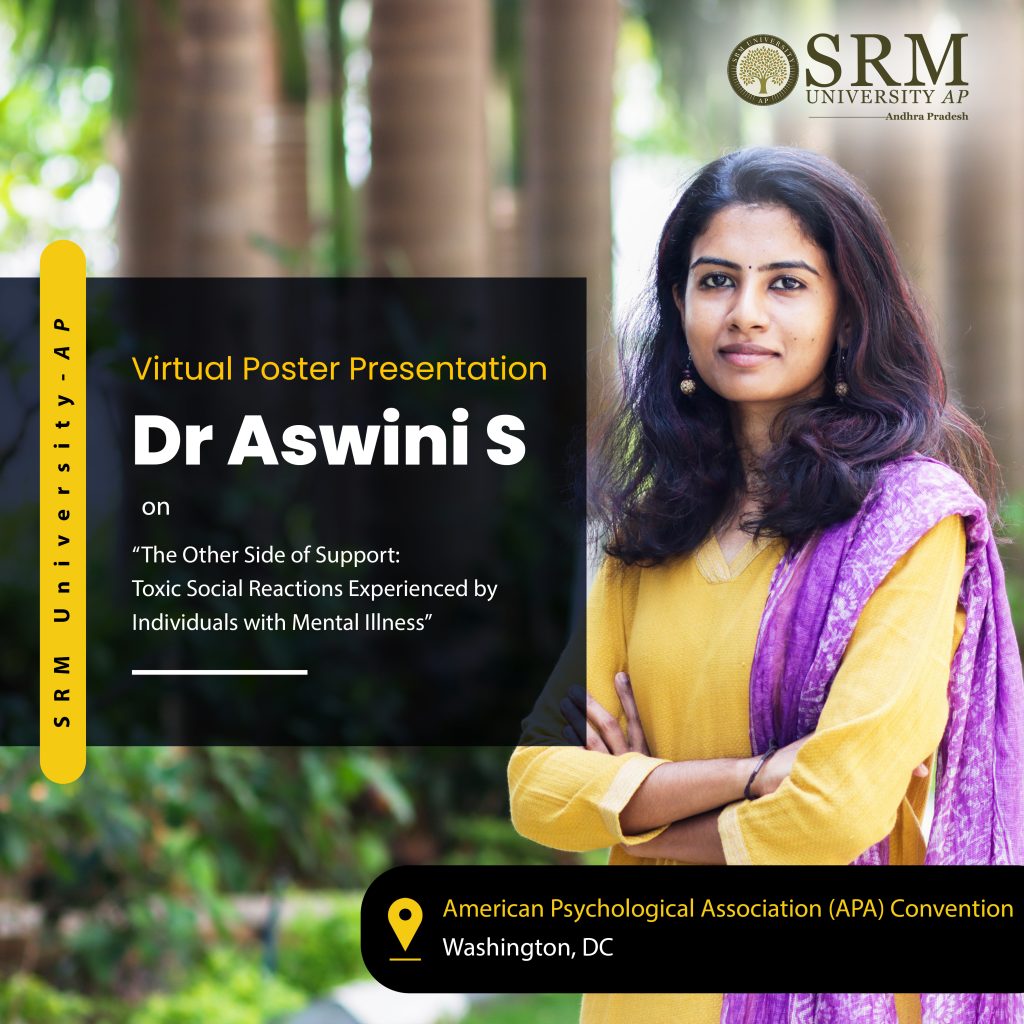 In a proud moment that highlights our institution’s commitment to excellence and innovation, we are thrilled to share the success of a recent poster presentation that graced the global stage.Dr Aswini S, Assistant Professor at the Department of Psychology at SRM University-AP recently represented the varsity at the American Psychological Association (APA) Convention in Washington, DC from August 3 – 5, 2023. The occasion was a prestigious Poster Presentation, titled, “The Other Side of Support: Toxic Social Reactions Experienced by Individuals with Mental Illness”
In a proud moment that highlights our institution’s commitment to excellence and innovation, we are thrilled to share the success of a recent poster presentation that graced the global stage.Dr Aswini S, Assistant Professor at the Department of Psychology at SRM University-AP recently represented the varsity at the American Psychological Association (APA) Convention in Washington, DC from August 3 – 5, 2023. The occasion was a prestigious Poster Presentation, titled, “The Other Side of Support: Toxic Social Reactions Experienced by Individuals with Mental Illness”
Abstract
Social support is undeniably an important aspect of everyday life, and it is particularly
important in the context of challenges. The role of social support as a protective factor is well established (Wright et al., 2013) in research, especially in the context of mental illness (Frame, 1981; Teo et al., 2020). While acknowledging the overwhelming evidence on the importance of social support, there is scant literature on the negative experiences of seeking and receiving support. The qualitative investigation revealed the toxic social reactions under the disguise of social support as reported by participants with mental illness (N=17). Participants experienced interactions which sometimes resembled social support but were either harmful or not beneficial to them. The frequently reported reactions of participants are trivialising of symptoms, toxic positivity, and fake sympathy. In comparison to physical illness, the indicators of mental illness are less objectively perceptible to others. Hence, the practice of dismissing symptoms and attributing disorders as momentary feelings, or imaginary experiences are found to be common. Moreover, the suggestion to be positive and reject anything that may trigger negative emotions along with the display of fake sympathy by people around is also found in participant narratives. This signifies the importance of studying social support through different dimensions rather than just focusing only on support that is helpful and beneficial. Future explorations can focus on understanding specific sources of support, kinds of support and the impact that such challenges have on the quality of relationships with significant others.
Keywords: Toxic positivity, mental illness, social support
The remarkable achievement underscores not only the quality of education we provide but also the dedication of our faculty in making impactful contributions to their fields.
- Published in Assistant Professor, News, Psychology, Psychology Faculty, Psychology News
Dr Azizuddin Khan deliberated upon Medication Adherence
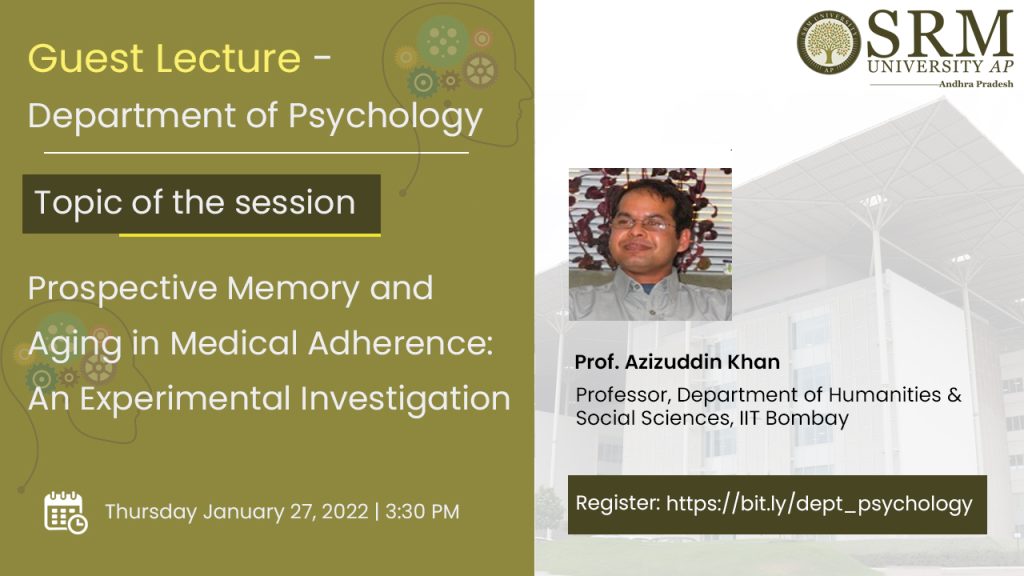 Department of Psychology, SRM University, AP-Andhra Pradesh organised a guest lecture on the topic “Prospective Memory and Aging in Medication Adherence: An Experimental Investigation” on January 27, 2022, from 3:30 to 4:30 pm. Dr Azizuddin Khan, Professor, Department of Humanities and Social Sciences, Indian Institute of Technology-Mumbai, attended the session as the eminent speaker.
Department of Psychology, SRM University, AP-Andhra Pradesh organised a guest lecture on the topic “Prospective Memory and Aging in Medication Adherence: An Experimental Investigation” on January 27, 2022, from 3:30 to 4:30 pm. Dr Azizuddin Khan, Professor, Department of Humanities and Social Sciences, Indian Institute of Technology-Mumbai, attended the session as the eminent speaker.
The session started with a brief introduction of Prof Khan by Mrs Ayesha Parveen Haroon, Lecturer, Department of Psychology. Thereafter, Prof Khan delivered his lecture wherein he deliberated upon the medical adherence, aging and prospective memory as well as the factors affecting medical adherence. Specifically, he emphasised the effect of memory and intellectual abilities on medical adherence. Following Prof Khan’s presentation, the questions raised by the audience were communicated to Prof Khan by Dr Aehsan Ahmad Dar, Assistant Professor, Department of Psychology. Prof Khan provided interesting insights on the questions raised. The programme ended with the vote of thanks delivered by Dr Ninad Patwardhan, Assistant Professor and Faculty Coordinator, Department of Psychology.
- Published in News, Psychology News
BSc Psychology students to pursue Masters in the UK, US universities
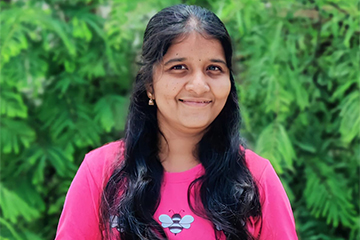 Sravani Govindu is proud to be a part of the first ever batch of Psychology from SRM University-AP. She is always amazed by the influence the faculty and friends had on her character development throughout the years. Sravani recollects how she was an unbothered soul without any focus before joining the university and what she became after experiencing the rhythm of the campus. During her university life, she recognised the value of having a sense of purpose. The continuous efforts from the faculty to provide the right amount of guidance and motivation will forever be a fuelling force in Sravani’s career. She is beyond grateful to the supportive academic community on the campus which became her backbone whenever she was uncertain. The value-oriented course structure at SRM AP encouraged her on many levels. Sravani adores the welcoming aura of the campus and the dynamics between students from various states and countries. She is ready to welcome a new chapter at Greenwich University while holding a bunch of memories from SRM AP.
Sravani Govindu is proud to be a part of the first ever batch of Psychology from SRM University-AP. She is always amazed by the influence the faculty and friends had on her character development throughout the years. Sravani recollects how she was an unbothered soul without any focus before joining the university and what she became after experiencing the rhythm of the campus. During her university life, she recognised the value of having a sense of purpose. The continuous efforts from the faculty to provide the right amount of guidance and motivation will forever be a fuelling force in Sravani’s career. She is beyond grateful to the supportive academic community on the campus which became her backbone whenever she was uncertain. The value-oriented course structure at SRM AP encouraged her on many levels. Sravani adores the welcoming aura of the campus and the dynamics between students from various states and countries. She is ready to welcome a new chapter at Greenwich University while holding a bunch of memories from SRM AP.
 Meenu Roy is proud to be an SRMite and belongs to the first batch of Psychology at the University. She is in awe of the momentum her personality growth acquired from the eventful campus life. Clubs and other university activities helped her try things beyond her expectations. She enjoyed the whole process of exploring herself throughout the academic venture at SRM University-AP. She finds it fortunate to have a supportive academic ecosystem at her crucial career junction. Meenu is about to pursue her master’s degree from the University of Westminster, UK. Her admiration towards the faculty and friends she had at SRM AP grows further as she continues to go places and prove herself. A part of the campus life and wisdom she enjoyed at the university will stay with her for a lifetime while she keeps on adding value to the recognition of SRM University-AP with her academic intelligence.
Meenu Roy is proud to be an SRMite and belongs to the first batch of Psychology at the University. She is in awe of the momentum her personality growth acquired from the eventful campus life. Clubs and other university activities helped her try things beyond her expectations. She enjoyed the whole process of exploring herself throughout the academic venture at SRM University-AP. She finds it fortunate to have a supportive academic ecosystem at her crucial career junction. Meenu is about to pursue her master’s degree from the University of Westminster, UK. Her admiration towards the faculty and friends she had at SRM AP grows further as she continues to go places and prove herself. A part of the campus life and wisdom she enjoyed at the university will stay with her for a lifetime while she keeps on adding value to the recognition of SRM University-AP with her academic intelligence.
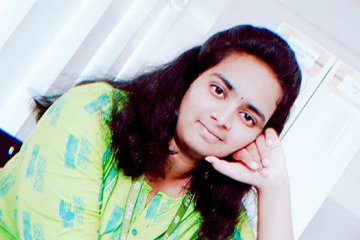 Uha Lakkireddy recently completed her bachelor’s degree in Psychology from SRM University-AP. The tremendous support and motivation from the university have helped her nurture self-confidence and self-satisfaction. Uha noticed how she transformed as an individual from the time of enrolling in the university until the time of graduation. As a psychology student, she was able to grasp several interesting theories which had exciting applications in real life. In-depth details included in the course structure assisted her in the most unexpected but necessary situations. Uha finds it very fascinating that the graduation period has essentially taught her some extremely valuable life lessons. She remembers learning the importance of physical activities in maintaining mental health through Sports Psychology. Uha’s journey as an ardent Clinical Psychology student is taking a huge turn from SRM AP to Greenwich University, UK. She gives all the credit to her faculty and peers, who have always encouraged her to work hard.
Uha Lakkireddy recently completed her bachelor’s degree in Psychology from SRM University-AP. The tremendous support and motivation from the university have helped her nurture self-confidence and self-satisfaction. Uha noticed how she transformed as an individual from the time of enrolling in the university until the time of graduation. As a psychology student, she was able to grasp several interesting theories which had exciting applications in real life. In-depth details included in the course structure assisted her in the most unexpected but necessary situations. Uha finds it very fascinating that the graduation period has essentially taught her some extremely valuable life lessons. She remembers learning the importance of physical activities in maintaining mental health through Sports Psychology. Uha’s journey as an ardent Clinical Psychology student is taking a huge turn from SRM AP to Greenwich University, UK. She gives all the credit to her faculty and peers, who have always encouraged her to work hard.
 Chandrika Reddy from BSc Psychology at SRM University-AP is excited to continue her studies in Psychology to the next level (Post Graduation) at Adelphi University, New York. She is among the bright students who have secured admission to global universities abroad. Chandrika ecstatically mentioned the exposure she collected from the carefully laid out curriculum and course structure at SRM AP. Her journey as an SRMite was quite eventful. She had excellent professors, classmates, and friends who contributed equally to her growth. She had various opportunities to get engaged in the activities aligned with the coursework and re-establish her hobbies. Being a student of the first graduating batch of BSc Psychology, Chandrika’s achievement is a motivation to all students. She thanked all the professors and peers for their kind support and encouragement throughout this journey.
Chandrika Reddy from BSc Psychology at SRM University-AP is excited to continue her studies in Psychology to the next level (Post Graduation) at Adelphi University, New York. She is among the bright students who have secured admission to global universities abroad. Chandrika ecstatically mentioned the exposure she collected from the carefully laid out curriculum and course structure at SRM AP. Her journey as an SRMite was quite eventful. She had excellent professors, classmates, and friends who contributed equally to her growth. She had various opportunities to get engaged in the activities aligned with the coursework and re-establish her hobbies. Being a student of the first graduating batch of BSc Psychology, Chandrika’s achievement is a motivation to all students. She thanked all the professors and peers for their kind support and encouragement throughout this journey.
- Published in Departmental News, News, Psychology News, Students Achievements
Mental health of school students during the COVID-19 pandemic in India
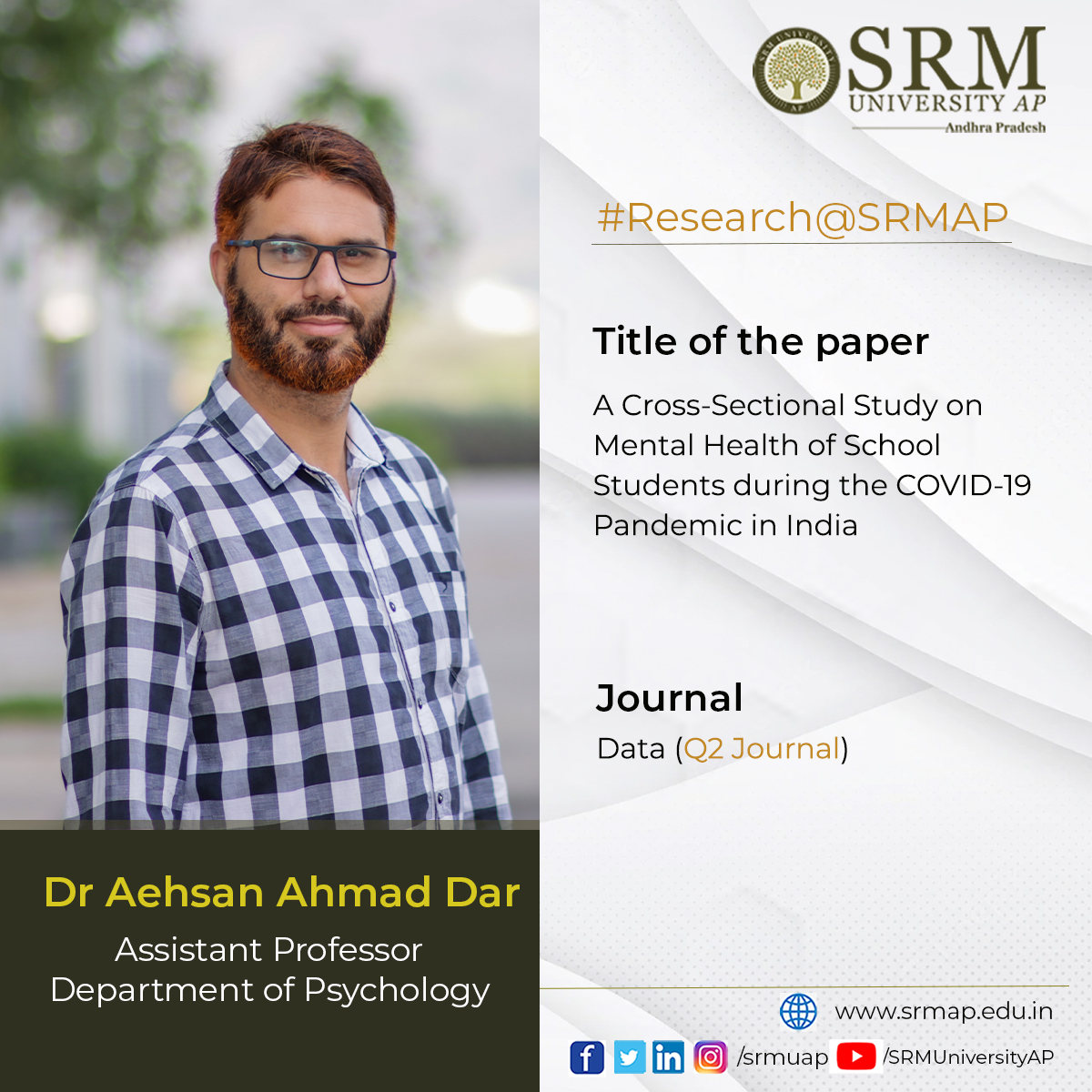
Dr Aehsan Ahmad Dar, Assistant Professor, Department of Psychology, published the article titled “A Cross-Sectional Study on Mental Health of School Students during the COVID-19 Pandemic in India” in the journal Data in collaboration with academicians from different universities across the country and abroad.
The present study estimated the mental health of school students during the COVID-19 pandemic. The findings revealed that the COVID-19 pandemic caused stress which increased the levels of anxiety and depression among the students. However, social support from family and friends was found to be a protective factor for mental health.
The findings of the research will serve as a reliable source of information for mental health professionals and policymakers to better understand the impact of the COVID-19 pandemic and other traumatic experiences on mental health. Therefore, necessary efforts are suggested to provide mental health support services to prevent the development of mental disorders.
Dr Aehsan’s future research plan is to study the mental health of youth and ascertain its risk and protective factors. About 19% of the world’s children live in India, which constitutes 42% of the total Indian population, and nearly half of these children are vulnerable and need care and protection. Due to various traumatic experiences, stress has increased among young people resulting in the development of various physical and mental disorders.
His research will focus on the pathogenic (posttraumatic stress disorder, depression, anxiety, somatization) and salutogenic (posttraumatic growth and resilience) consequences of trauma to help the youth withstand adverse experiences to develop psychological competence. The research will provide insights into the mental health status of youth that would be helpful for the administration, policymakers, and other voluntary organizations to understand effective ways to devise and implement the best intervention programs for maximizing mental health protective factors and minimizing its risk factors.
- Published in Departmental News, News, Psychology News, Research News
Estimating ACEs among Young Adults in Kashmir
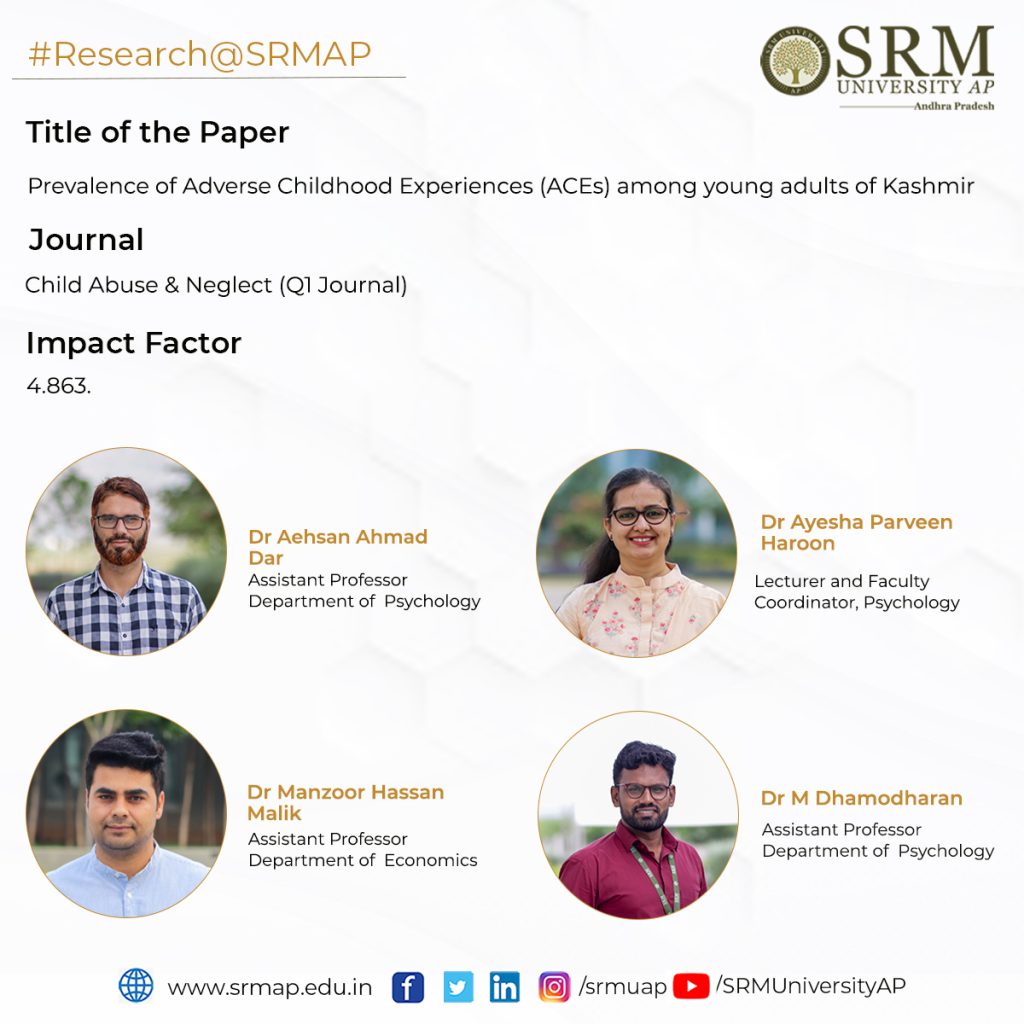
The Faculty of Psychology and Economics have jointly published a paper titled “Prevalence of Adverse Childhood Experiences (ACEs) among young adults of Kashmir” in the Q1 Journal Child Abuse & Neglect, having an impact factor of 4.863. Dr Aehsan Ahmad Dar, Assistant Professor, Department of Psychology; Dr Manzoor Hassan Malik, Assistant Professor, Department of Economics; Dr Ayesha Parveen Haroon, Lecturer, Department of Psychology; Dr Dhamodharan M, Assistant Professor, Department of Psychology have worked on interpreting the emotional constraints that are harboured among the young adults experiencing the adversities in turbulent Kashmir.
Abstract
The present study estimated the prevalence of ACEs among young adults studying in the colleges and universities of Kashmir, India. Findings disclosed that 15.4 % of the students reported high exposure to ACEs, 13.4% of the participants reported high exposure to ACEs, 26.3 % of the sample reported moderate exposure to ACEs, 33.0 % of the youth reported low exposure to ACEs and 11.8 % of the respondents reported no exposure to ACEs. The prevalence of ACEs was found to be 88.2 % (females: 82.7 % and males: 90.8 %) with a mean of 4.72 adverse events during childhood. The ACEs with the highest level of prevalence were “often or very often insulted or put down” (49.8 %), followed by “often or very often hurt physically” (47.6 %), “often or very often pushed, grabbed, or slapped” (41.6 %), “lived with a mentally ill household member” (28.3%), “touched or sexually fondled” (25.3 %),” household member being into the prison” (25.0%) and “witnessed father or mother being pushed, grabbed, slapped, or had something thrown at them” (24.0%).
Practical Implementation of the Research
The findings of the study will serve as a reliable source for healthcare professionals, policymakers and NGOs to better understand the impact of ACEs on the health and well-being of individuals. Since ACEs are associated with several immediate and long-term health hazards, therefore, necessary efforts in this direction are suggested to advocate the early targeted intervention to reduce ACEs and their impact as well as design effective measures to improve the health and well-being of young adults, thereby reducing the development of physical and mental disorders.
Collaborations
- Prof. Sibnath Deb, Rajiv Gandhi National Institute of Youth Development, Sriperumbudur, Tamil Nadu, India.
- Dr Manzoor Hassan Mali, Department of Economics, SRM University-AP, Andhra Pradesh, India
- Prof. Waheeda khan, Department of Clinical Psychology, Faculty of Behavioural Sciences, Shree Guru Gobind Singh Tricentenary University, Budhera, Gurugram, Delhi-NCR, India.
- Dr Ayesha Parveen Haroon, Department of Psychology, SRM University-AP, Andhra Pradesh, India
- Dr Amra Ahsan, Department of Clinical Psychology, Faculty of Behavioural Sciences, Shree Guru Gobind Singh Tricentenary University, Budhera, Gurugram, Delhi-NCR, India
- Dr Farhat Jahan, Department of Clinical Psychology, Faculty of Behavioural Sciences, Shree Guru Gobind Singh Tricentenary University, Budhera, Gurugram, Delhi-NCR, India
- Dr Bushra Sumaiya, Faculty of Education, Shree Guru Gobind Singh Tricentenary University, Budhera, Gurugram, Delhi-NCR, India.
- Shaheen Yawar Bhat, Department of Physiology, All India Institute of Medical Sciences, New Delhi, India.
- Dr Dhamodharan M, Department of Psychology, SRM University-AP, Andhra Pradesh, India
- Mohamad Qasim, Independent Researcher
The research cohort plans to study youth’s mental health and ascertain its risk and protective factors. About 19% of the world’s children live in India, which constitutes 42% of the total Indian population, and nearly half of these children are vulnerable and need care and protection. Due to various traumatic experiences, stress has increased among young people resulting in various physical and mental disorders.
The research will focus on the pathogenic (post-traumatic stress disorder, depression, anxiety, somatisation) and salutogenic (post-traumatic growth and resilience) consequences of trauma to help the youth withstand adverse experiences and develop psychological competence. The research will provide insights into the mental health of youth that would be helpful for the administration, policymakers, and other voluntary organisations to understand effective ways to devise and implement the best intervention programs for maximising mental health protective factors and minimising its risk factors.
- Published in Departmental News, Economics Current Happenings, Economics News, News, Psychology News, Research News
Social Support and the Resilience Among Young Adults in Kashmir
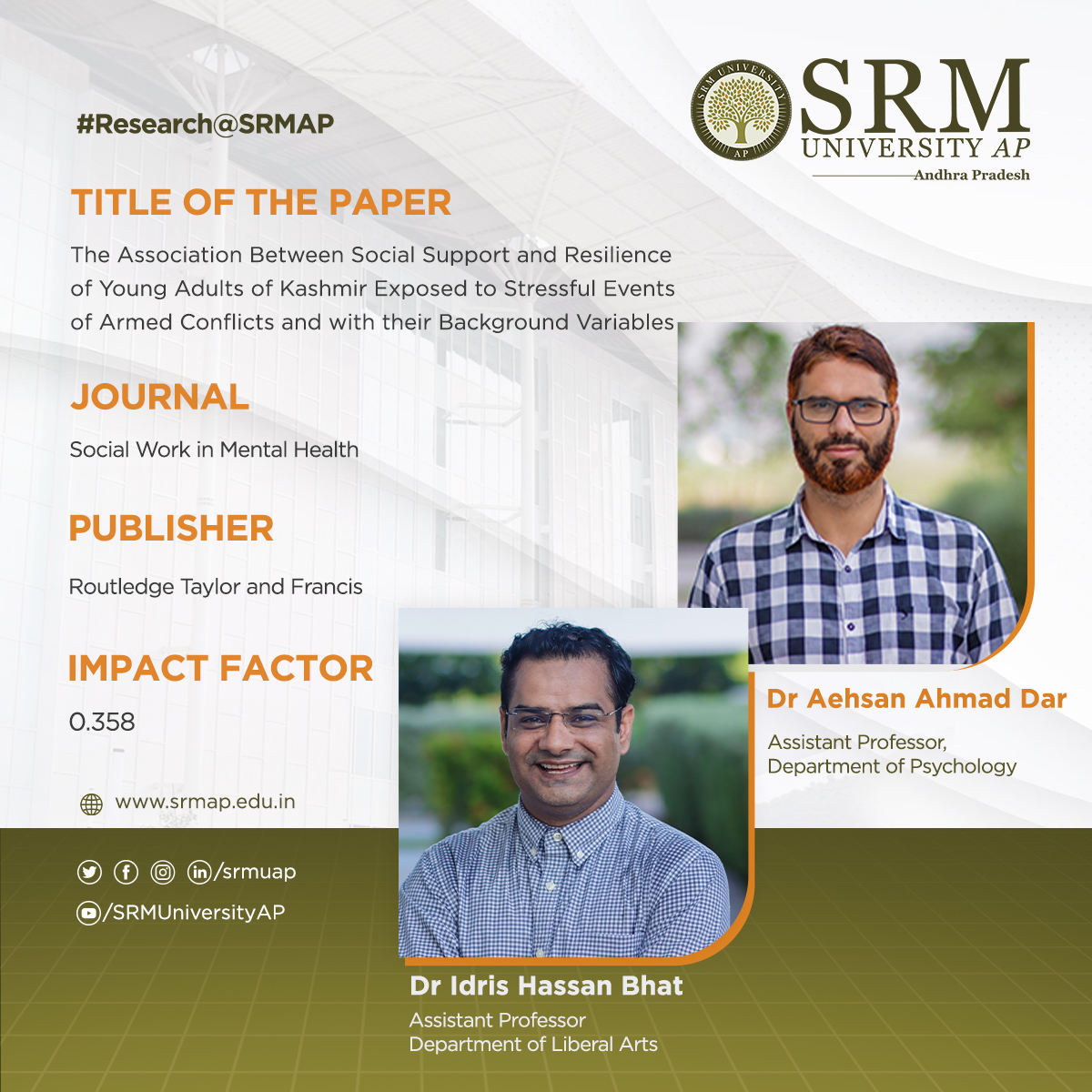 The latest research paper of Dr Aehsan Ahmad Dar, Assistant Professor, Department of Psychology, and Dr Idris Hassan Bhat, Assistant Professor, Department of Liberal Arts, examines the relationship between social support and resilience among young adults in Kashmir who have been exposed to the traumatic events of armed conflicts. His paper titled The Association Between Social Support and Resilience of Young Adults of Kashmir Exposed to Stressful Events of Armed Conflicts and with Their Background Variables was published in the esteemed journal Social Work in Mental Health, which is issued by the reputed publisher Routledge Taylor and Francis.
The latest research paper of Dr Aehsan Ahmad Dar, Assistant Professor, Department of Psychology, and Dr Idris Hassan Bhat, Assistant Professor, Department of Liberal Arts, examines the relationship between social support and resilience among young adults in Kashmir who have been exposed to the traumatic events of armed conflicts. His paper titled The Association Between Social Support and Resilience of Young Adults of Kashmir Exposed to Stressful Events of Armed Conflicts and with Their Background Variables was published in the esteemed journal Social Work in Mental Health, which is issued by the reputed publisher Routledge Taylor and Francis.
Through the research, they found that social support plays a crucial role in enhancing the resilience of young adults and reducing the adverse effects of traumatic experiences. This publication is a significant contribution to the field of social work and mental health, particularly in the context of the ongoing conflict in Kashmir. The findings of the researchers highlight the importance of social support in promoting the mental health and well-being of individuals who have experienced trauma.
Abstract
The current study examined the association of social support and background variables with resilience among young adults exposed to traumatic and stressful events of armed conflict in Kashmir, India. Data were collected from 693 participants using a multi-stage sampling method. Findings revealed that social support and gender were positively associated with resilience, whereas education, income, and maternal education were negatively associated with resilience. Moreover, feeling insecure and psychologically distressed as a result of the conflict was negatively associated with resilience, whereas the perception that the Kashmir conflict would be resolved was positively associated with resilience. The findings suggest fostering resilience in this population.
- Published in Departmental News, Liberal Arts News, News, Psychology News, Research News
An appraisal of India’s comparative advantage in information technology exports
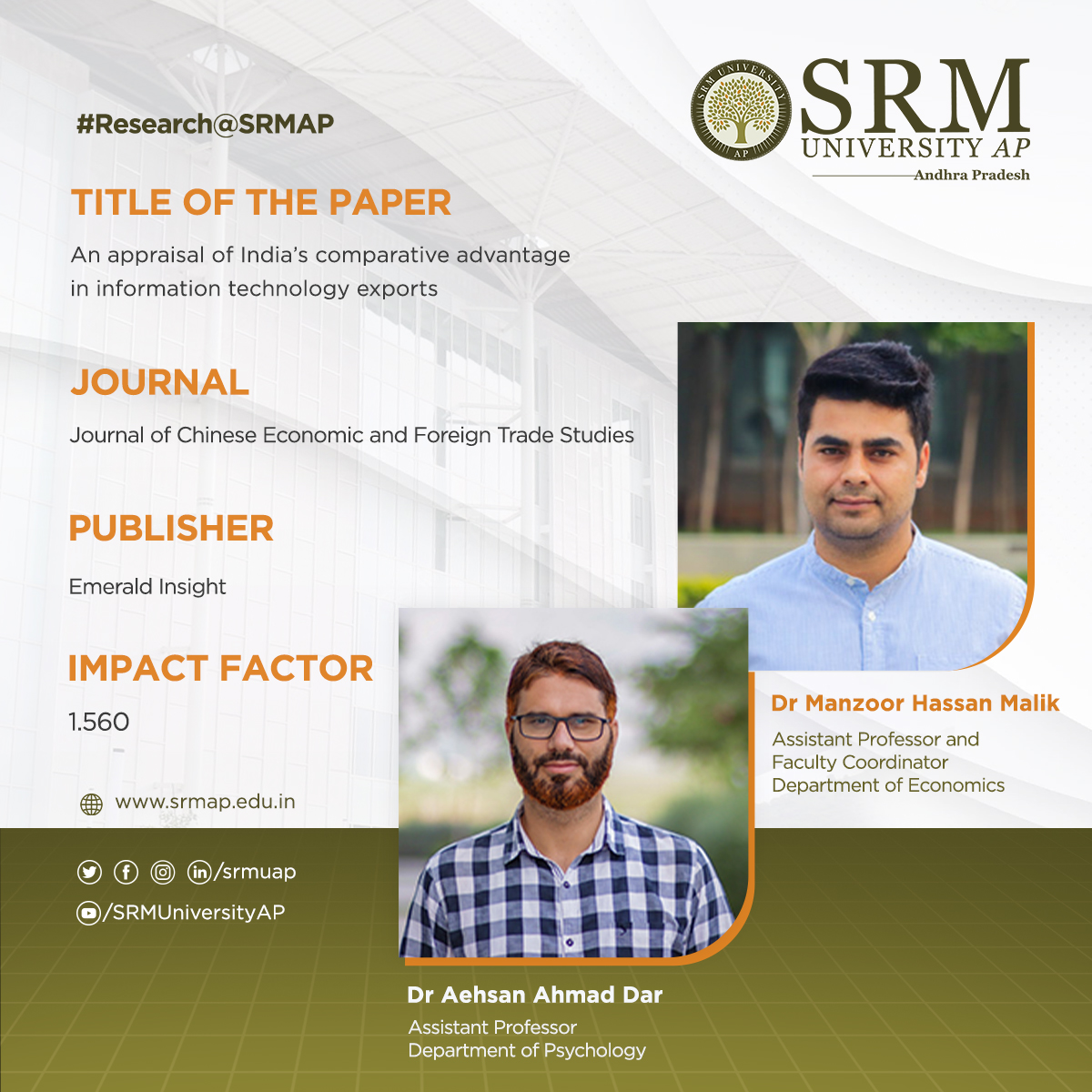 Researchers of the School of Liberal Arts and Social Sciences have worked on India’s comparative advantage in information technology exports with competing developing nations, including China, the Philippines, Malaysia, and Brazil. The latest paper published by Assistant Professor Dr Manzoor Hassan Malik, Department of Economics and Assistant Professor Dr Aehsan Ahmad Dar, Department of Psychology, has implications for attaining sustainability in IT export growth. It is suggested that policies are directed at enhancing the overall performance of the IT sector. The novelty of the present study lies in the estimation of India’s competitiveness in IT exports in relation to the group of reference countries, namely China, the Philippines, Malaysia, and Brazil. With its policy recommendations, this research is helping to shape the sustainability of the IT sector.
Researchers of the School of Liberal Arts and Social Sciences have worked on India’s comparative advantage in information technology exports with competing developing nations, including China, the Philippines, Malaysia, and Brazil. The latest paper published by Assistant Professor Dr Manzoor Hassan Malik, Department of Economics and Assistant Professor Dr Aehsan Ahmad Dar, Department of Psychology, has implications for attaining sustainability in IT export growth. It is suggested that policies are directed at enhancing the overall performance of the IT sector. The novelty of the present study lies in the estimation of India’s competitiveness in IT exports in relation to the group of reference countries, namely China, the Philippines, Malaysia, and Brazil. With its policy recommendations, this research is helping to shape the sustainability of the IT sector.
The paper titled An appraisal of India’s comparative advantage in information technology exports was published in the Journal of Chinese Economic and Foreign Trade Studies with an impact factor of 1.560.
Abstract
The purpose of this study is to estimate revealed comparative advantage and Normalised Revealed Comparative Advantage (NRCA) indices of India’s Computer and Information Services (CIS) export competitiveness about Information Technology (IT) competing developing nations, such as China, Philippines, Malaysia and Brazil. Using annual data of total exports for CIS, transportation (TNS), travel (TVL) and insurance (INS) services under service categories of the balance of payment, the present study estimates the pattern of Comparative Advantage (CA) in India’s CIS exports with respect to IT competing developing nations such as China, Philippines, Malaysia and Brazil from 2000 to 2018. The choice of the study period is determined by the availability of consistent data on IT service exports of these nations. The study also estimates the export position of CIS export in comparison to India’s traditionally strong commercial services export of TNS, TVL and INS during the study period. Both indices showed that India had a strong CA in CIS compared to the selected nations, indicating India’s relative export performance to be stronger than that of China, Malaysia, the Philippines, and Brazil. The cross-service index showed that India’s relative specialisation level in CIS with respect to the world’s average specialisation level was stronger than its relative specialisation level in TNS, TVL and INS services. Furthermore, The NRCA cross-nation index showed that India’s NRCA index score has been declining since 2010 with respect to these nations, which implied a decline in the competitiveness of CIS. On the other hand, NRCA has increased in the case of the Philippines, Malaysia and Brazil for most of the period post-2010.
- Published in Departmental News, Economics News, Faculty Achievements, News, Psychology News, Research News
Presented Paper at the 32nd International Annual Convention of the National Academy of Psychology
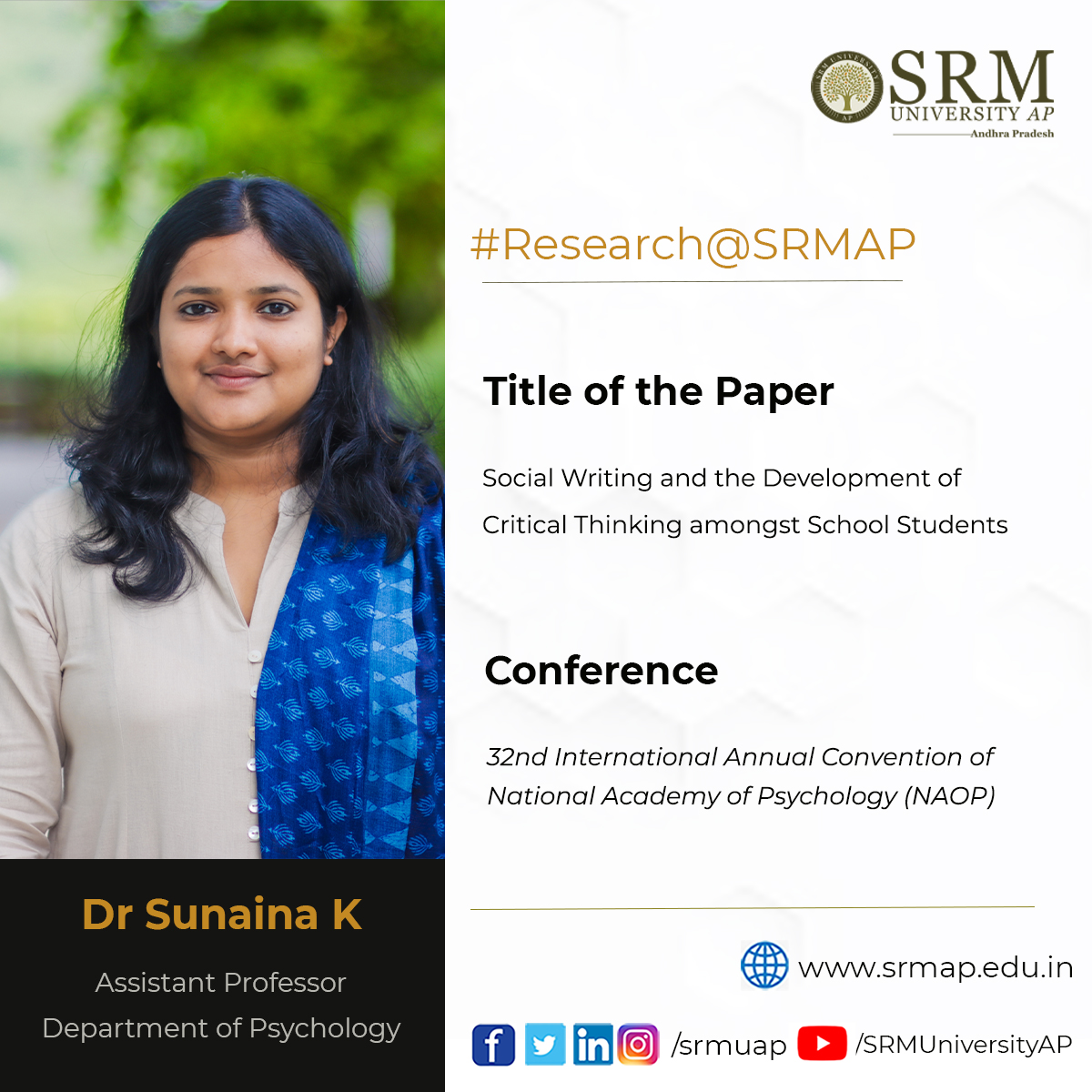 The Annual Conventions of the National Academy of Psychology (NAOP) aim to provide a platform to present, discuss, and debate issues that confront individuals, groups, and communities in this fast-changing world. Dr Sunaina K, Assistant Professor of the Department of Psychology, has presented a paper titled Social Writing and the Development of Critical Thinking amongst School Students at the 32nd International Annual Convention of the National Academy of Psychology (NAOP), held at Ahmedabad University, Gujarat, from March 3 to 5, 2023.
The Annual Conventions of the National Academy of Psychology (NAOP) aim to provide a platform to present, discuss, and debate issues that confront individuals, groups, and communities in this fast-changing world. Dr Sunaina K, Assistant Professor of the Department of Psychology, has presented a paper titled Social Writing and the Development of Critical Thinking amongst School Students at the 32nd International Annual Convention of the National Academy of Psychology (NAOP), held at Ahmedabad University, Gujarat, from March 3 to 5, 2023.
Abstract
This study attempted to examine the texts, contexts and voices of young adolescents in social writing activities in schools and how thinking is constructed through the same activities. An intervention study of one-year duration on social writing, based on a longitudinal quasi-experimental design, has been conducted with 15 students in a government school in Kozhikode district in Kerala. The intervention programme was conducted with the help of a module of writing activities prepared by the researcher by using the Vygotskian pedagogic ideas. Each writing session was preceded by a dialogue session between the adult member and the students.
The study employed Thematic Content Analysis as the method of data analysis. The thematic analysis of the mediated learning of social writing unfolds the dialectical interplay between the human mediators, cultural tools and the motives for developing critical thinking skills in the students. From the analysis of the pattern of appearing ‘self-reflections’, a domain of critical thinking (Barnette, 1997), it can be said that interactive participation in the dialogue session enhances participation in the writing activities with the involvement of self. Active participation in the dialogue session helps the students gather maximum information on the theme of dialogues (collection of everyday concepts) and also makes some generalisations. These generalised ideas are transforming into conceptualised thoughts (thinking in ‘scientific concepts’) when the students go through in a deliberate, systematic thinking process while writing. This conceptualisation of ideas, visible in students’ texts, is the base of the critical thinking that is getting reflected in their writings and further helps them in critical reasoning, self-reflection and thinking about critical actions while writing.
- Published in Departmental News, News, Psychology News, Research News
Delivered Lecture at the Two – day National Conference on Youth Development
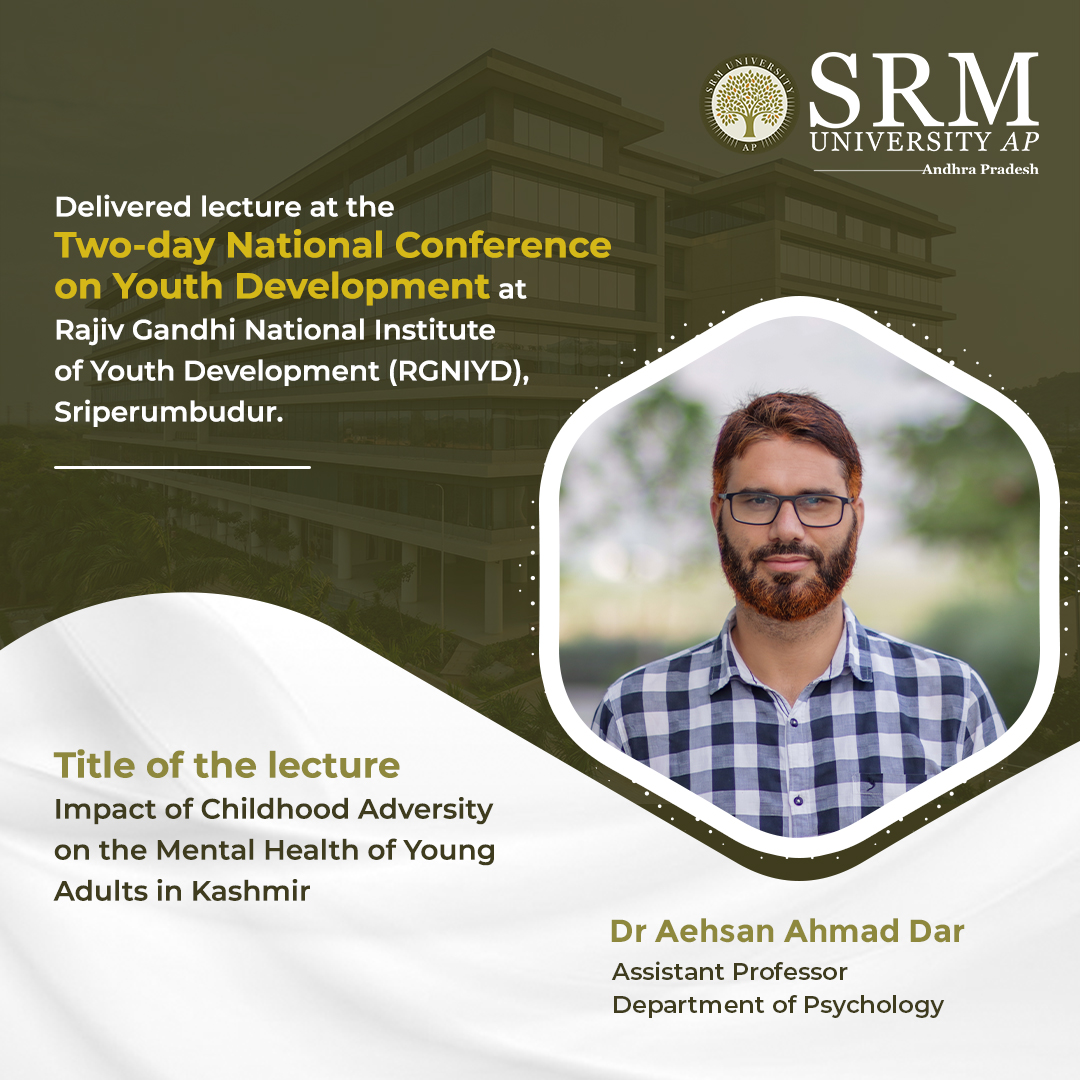 Dr Aehsan Ahmad Dar, Assistant Professor, Department of Psychology, delivered a lecture titled Impact of Childhood Adversity on the Mental Health of Young Adults in Kashmir at the Two – day National Conference on Youth Development held on March 24 and 25, 2023. Youth in the 21st Century: Prospects and Psychosocial Challenges was the theme of the conference, which was organised by the Department of Social Work and Department of Applied Psychology, Rajiv Gandhi National Institute of Youth Development (RGNIYD), Sriperumbudur, Tamil Nadu, in collaboration with ICMR – NIRT, Chennai.
Dr Aehsan Ahmad Dar, Assistant Professor, Department of Psychology, delivered a lecture titled Impact of Childhood Adversity on the Mental Health of Young Adults in Kashmir at the Two – day National Conference on Youth Development held on March 24 and 25, 2023. Youth in the 21st Century: Prospects and Psychosocial Challenges was the theme of the conference, which was organised by the Department of Social Work and Department of Applied Psychology, Rajiv Gandhi National Institute of Youth Development (RGNIYD), Sriperumbudur, Tamil Nadu, in collaboration with ICMR – NIRT, Chennai.
Abstract of the Lecture
The study examines the impact of Adverse childhood experiences (ACEs) on mental health among young adults in Kashmir. A cross-sectional research design was followed to study the effect of ACEs on the mental health of Kashmiri youth by employing a multi-stage sampling method. Data were collected from 693 research participants who were studying in different colleges and universities in Kashmir, with the help of the Adverse Childhood Experiences scale and Mental Health Inventory (MHI-18). Findings revealed that various adversities during childhood, including psychological abuse, physical abuse, contact sexual abuse, household substance abuse, violent household treatment of mothers and fathers, household mental illness, and household criminal behaviour, had a significant impact on the mental health of Kashmiri youth in terms of increased anxiety, depression and loss of behavioural control and decreased positive affect.
Practical Implementation of the Findings
ACEs are traumatic events that individuals under 18 have experienced. Various individual, family, and community factors can affect a child’s likelihood of experiencing ACEs, and it causes long-term risks for mental health with the potential to carry over beyond the present generation. ACEs are linked to chronic health problems, mental illness, and adult risk-taking behaviours. There is a “dose-response relationship” between ACEs and health outcomes. Therefore, findings suggest advocating early targeted interventions to reduce ACEs and their impact on young people’s mental health in Kashmir. There is a need to design efficient measures, to enhance ACE resilience programs and ‘trauma-informed’ approaches to tackle the longer-term impact of ACEs on health and wellbeing.
- Published in Departmental News, News, Psychology News, Research News

